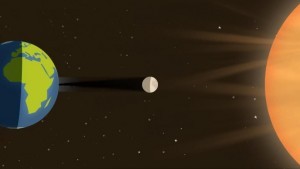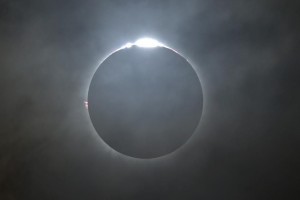The total solar eclipse on 21 August will be the first to pass across the whole of the U.S., from the Pacific to the Atlantic, in 99 years.
Total solar eclipses are a rarer occurrence than solar eclipses, which take place on average once every 18 months.
While the demise of Earth is predicted to happen around seven billion years from now, when the expanding sun engulfs and destroys our planet, life forms will see the last total solar eclipse much sooner than then—around 600 million years from now.
This is because the moon is slowly moving away from Earth, disrupting the intricate balance that causes the sun’s light to be blocked out. “A total eclipse is a dance with three partners: the moon, the sun and Earth,” Richard Vondrak, a lunar scientist at NASA’s Goddard Space Flight Center, said in a statement. “It can only happen when there is an exquisite alignment of the moon and the sun in our sky.”
During an eclipse, the moon passes in front of the sun, with the alignment and size matching—while the Sun is about 400 times larger than the moon, it is also about 400 times farther away, meaning they appear the same size during an eclipse.
The moon is currently receding from Earth at a rate of between one and one-and-a-half inches per year. Eventually, when the moon moves far enough away, it will no longer be able to cover the sun in the way it does now.
“Over time, the number and frequency of total solar eclipses will decrease,” Vondrak said. “About 600 million years from now, Earth will experience the beauty and drama of a total solar eclipse for the last time.
In an interview with Newsweek last month, Bill Nye spoke about the forthcoming eclipse and how these events are hugely special as they help us consider fundamental questions about life, such as where we came from and if we are alone in the universe.
“If you want to understand where we came from, you have to understand space. And the eclipse is an amazing event that helps anyone understand that we live on a sphere with a moon and a sun and other planets, and we are part of this extraordinary larger whole that you could call creation or the cosmos. It’s something that gets me every single day of my life. Every day I marvel at the insight that we are made of the same stuff, the same dust, as the stars. We are made of stardust. If you say: what’s the meaning of life? I’m not sure, but it has to do with being part of the cosmos.
“The eclipse is a moment that reminds us all in just a few minutes of our extraordinary place in space on this sphere covered with liquid water, with a moon tidally locked, in orbit around the sun. We can predict these events within less than a second, because we understand the mathematics of the universe so well. And we’re just some humble species wandering around on the outskirts of a regular galaxy. We’re no big deal, yet we can understand it all, and that to me is wonderful and amazing, and the eclipse to me is part of that.”
Ask me anything
Explore related questions






